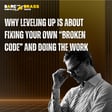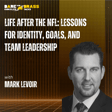
Veterans Day Panel: Cyber Journeys, Skills Transition, and Lessons Learned
🎙️ Veterans Day Podcast Panel!
We brought together an incredible panel of veterans who made the leap into cybersecurity:
George K and George A get into a raw and honest conversation about:
🔄 The realities of transitioning out to civilian life
😳 The culture shock of moving from military to corporate life
👏 Why military experience IS relevant experience (even if you think it isn't)
🤝 The power of networking and how to do it well
Many thanks to our panelists!
- Rick McElroy (USMC)
- Tom Marsland (US Navy)
- Larci Robertson (US Navy)
- Rafael Nuñez (US Air Force)
- and George A (Canadian Army)
————
👊⚡️BECOME A SHOW SUPPORTER
https://ko-fi.com/bareknucklesbrasstacks
For as little as $1 a month, you can support the show and get exclusive member benefits, or send a one-time gift!
Your contribution covers our hosting fees, helps us make cool events and swag, and it lets us know that what we're doing is of value to you.
We appreciate you!



















